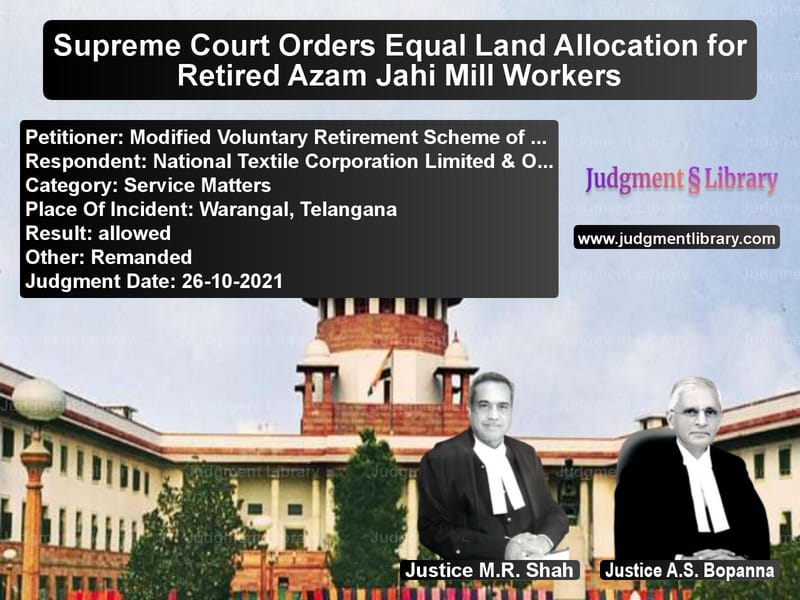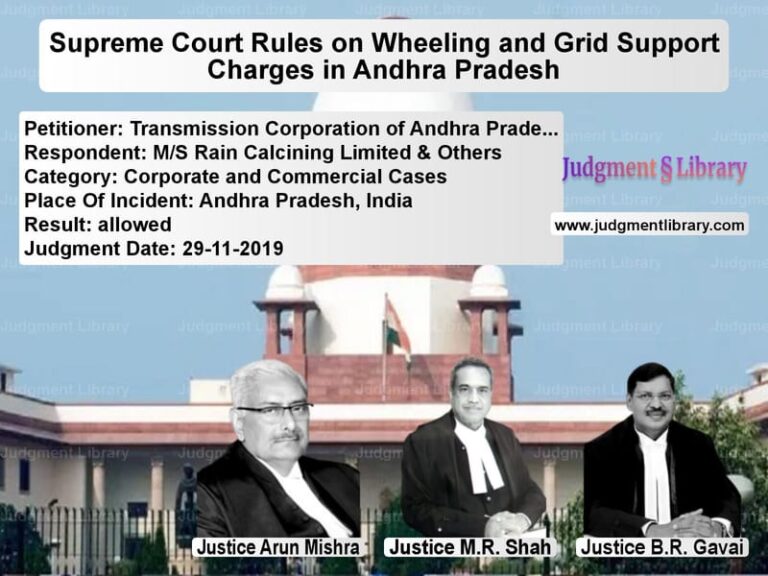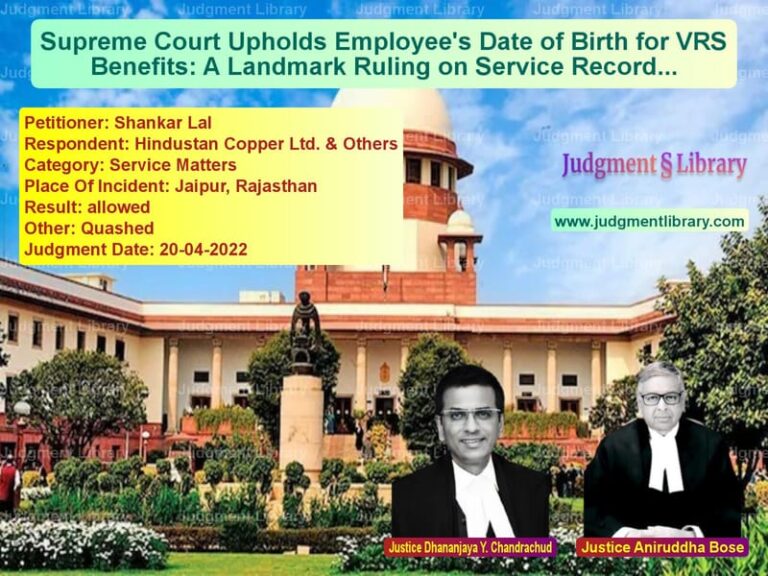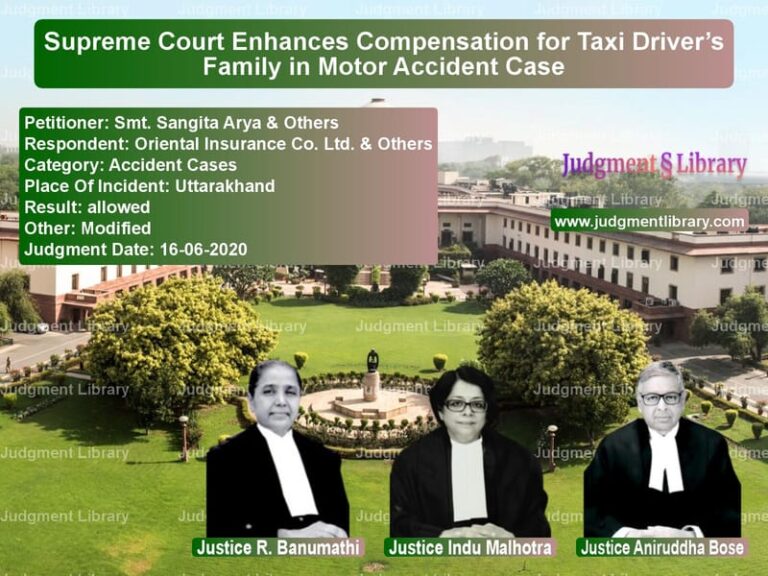Supreme Court Orders Equal Land Allocation for Retired Azam Jahi Mill Workers
The Supreme Court of India, in a landmark ruling in Modified Voluntary Retirement Scheme of 2002 of Azam Jahi Mill Workers Association vs. National Textile Corporation Limited, directed that all retired workers of the Azam Jahi Mill must receive equal housing benefits. This decision addresses a long-standing dispute over land allocation and the rights of retired workers under the Modified Voluntary Retirement Scheme (MVRS) of 2002.
Background of the Case
The Azam Jahi Mill was a government-owned textile unit located in Warangal, Telangana. Due to financial losses, the mill was shut down in 2002, leaving more than 452 workers unemployed. These workers had been residing in quarters owned by the mill for decades.
After the mill’s closure, the Telangana State Government, along with Kakatiya Urban Development Authority (KUDA), allocated 200 square yards of land each to 134 employees who had continued occupying their quarters post-closure. However, 318 retired workers, who had vacated their quarters in compliance with an eviction notice issued in 1986, were denied similar benefits.
The affected workers petitioned the Telangana High Court, which initially ruled in favor of equal treatment. However, the decision was later overturned, leading the workers to appeal before the Supreme Court.
Petitioners’ Arguments
The Azam Jahi Mill Workers Association made the following arguments:
- All workers retired under the same MVRS 2002 scheme and should receive equal benefits.
- It was unfair to grant housing benefits only to 134 workers while denying the same to 318 workers.
- The Telangana Government’s decision violated Article 14 (Right to Equality) of the Constitution.
- Eviction in 1986 was not voluntary; the 318 workers were forced to leave.
- The workers had legitimate expectations of receiving similar treatment as their colleagues.
Respondents’ Arguments
The State Government, KUDA, and National Textile Corporation (NTC) opposed the petition, arguing that:
- The land was allocated only because 134 workers resisted eviction.
- The 318 workers had already vacated the premises, forfeiting any claim.
- KUDA had purchased the mill land and had no obligation to provide housing to all workers.
- The allocation was a one-time decision that could not be extended to others.
Supreme Court’s Legal Analysis
1. Violation of Article 14 (Right to Equality)
The Supreme Court ruled:
“There is no rational basis for treating 134 workers differently from 318 workers. Both groups retired under the same scheme, worked for the same employer, and faced the same challenges after retirement.”
2. Government’s Welfare Obligation
The Court held that the State Government and KUDA could not justify their actions:
“A welfare measure must apply equally to all beneficiaries. By selectively allotting land to only 134 workers, the State violated the fundamental principles of fairness and equality.”
3. Lack of Justification for Selective Allocation
The Court rejected the argument that land was allocated to avoid litigation:
“Rewarding workers who defied eviction notices while denying benefits to those who followed the law sets a dangerous precedent and goes against the principle of equal treatment.”
4. Directions to the Government
The Supreme Court ordered:
- The 318 workers must be allotted 200 square yards of land each, similar to the 134 employees.
- KUDA and NTC must work with the State Government to identify available land for allocation.
- The process must be completed within six months.
Implications of the Judgment
This ruling ensures:
- All workers under MVRS 2002 receive equal benefits.
- The government acts in good faith and fairness while implementing welfare schemes.
- Housing benefits cannot be selectively applied based on past occupation of quarters.
This ruling sets a strong precedent for industrial worker welfare and ensures equal treatment under retirement schemes.
Judges: The judgment was delivered by M.R. Shah and A.S. Bopanna.
Petition Result: Allowed
Petitioner Name: Modified Voluntary Retirement Scheme of 2002 of Azam Jahi Mill Workers Association.Respondent Name: National Textile Corporation Limited & Ors..Judgment By: Justice M.R. Shah, Justice A.S. Bopanna.Place Of Incident: Warangal, Telangana.Judgment Date: 26-10-2021.
Don’t miss out on the full details! Download the complete judgment in PDF format below and gain valuable insights instantly!
Download Judgment: modified-voluntary-r-vs-national-textile-cor-supreme-court-of-india-judgment-dated-26-10-2021.pdf
Directly Download Judgment: Directly download this Judgment
See all petitions in Employment Disputes
See all petitions in Pension and Gratuity
See all petitions in Public Sector Employees
See all petitions in Judgment by Mukeshkumar Rasikbhai Shah
See all petitions in Judgment by A. S. Bopanna
See all petitions in allowed
See all petitions in Remanded
See all petitions in supreme court of India judgments October 2021
See all petitions in 2021 judgments
See all posts in Service Matters Category
See all allowed petitions in Service Matters Category
See all Dismissed petitions in Service Matters Category
See all partially allowed petitions in Service Matters Category







